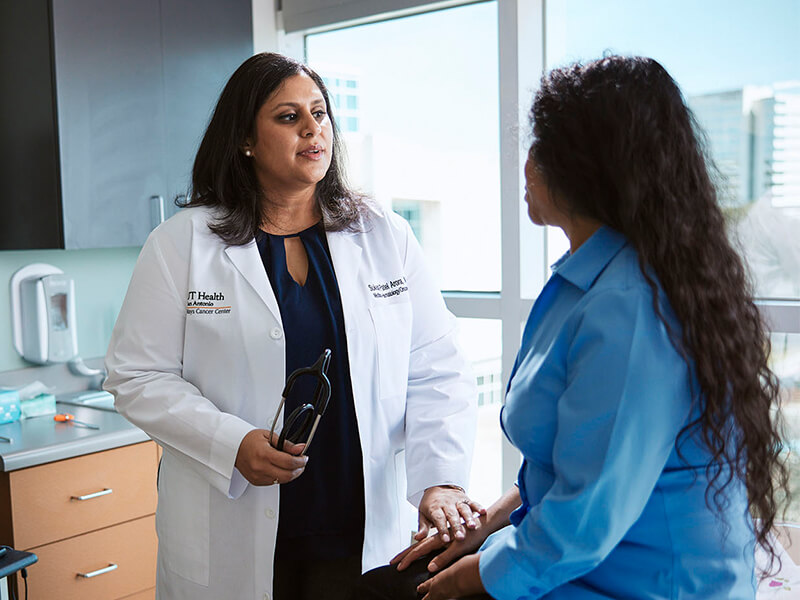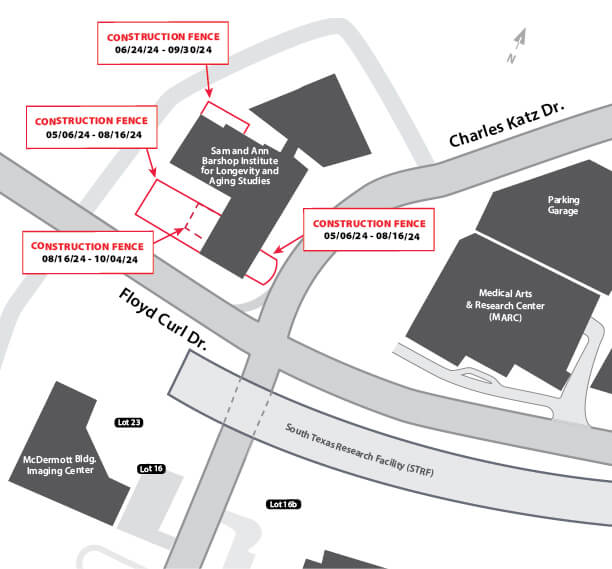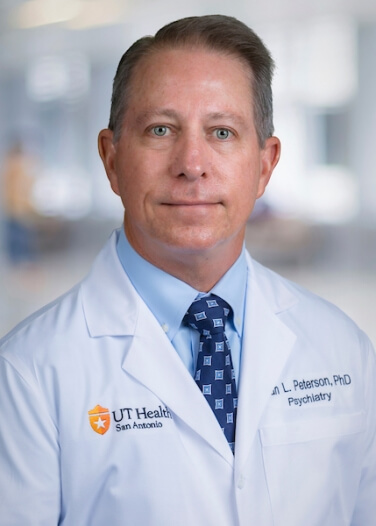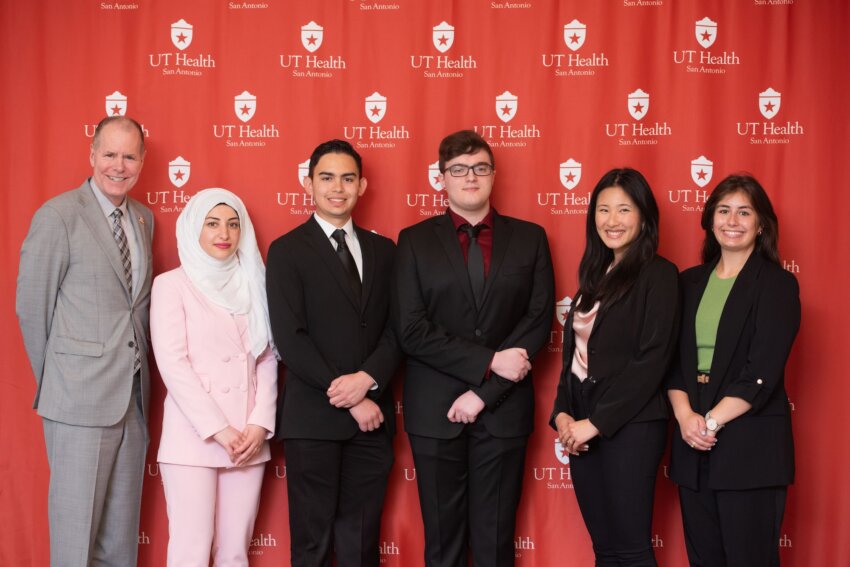Colorectal cancer is now the primary cause of cancer-related deaths among young men under 50 and the second leading cause among women in the same age group, according to the American Cancer Society.
The rise in younger men and women developing colon cancer is a trend Alicia Logue, MD, has observed over the last 10 years. Logue is a fellowship-trained colorectal surgeon at the Mays Cancer Center at UT Health San Antonio.
“If I were asked the average age of a patient when I finished residency 16 years ago, my answer would be different,” she said. “Now, at least 1/3 of my patients are under 50.”
Colon and rectal cancers are tumors of the large intestine. Risk factors for developing the disease, according to the Centers for Disease Control and Prevention, include inflammatory bowel disease, family history and in rare cases an inherited trait.
Certain lifestyle choices can also increase the risk of developing the disease. These include a lack of regular exercise and a diet lacking in fruits and vegetables, as well as one low in fiber and high in fat and processed meats. Being overweight or obese, along with the use of alcohol and tobacco, can also elevate the risk for developing the disease.
Colorectal cancer symptoms
Colorectal cancer can start as a polyp or small, abnormal grouping of cells in the colon’s lining. Logue said polyps can develop and mutate into cancer slowly, and symptoms are common enough that patients ignore them.
“The symptoms are oftentimes subtle and attributed to common life circumstances, such as fatigue, stress or difficulty maintaining a healthy lifestyle,” Logue said. “It’s not unusual for most of us to have symptoms such as occasional stomach discomfort, fatigue, constipation or seeing small amounts of blood in the stool. They are symptoms that can easily be dismissed or attributed to less serious conditions.”
Logue said the following symptoms should prompt a visit to the doctor: change in bowel habits, rectal bleeding, persistent fatigue and unexplained anemia.
Regular screenings are the best way to prevent developing the disease and the gold standard for screening is a colonoscopy. If polyps are found during the screening, they can be removed before they progress into cancer.
Alternate screenings, such as stool sample tests, can be up to 95% effective in detecting cancer.

The latest treatment options for personalized care
Treatment plans for patients are as individual as the patient. Following a patient’s diagnosis and tumor removal surgery, a multidisciplinary team of doctors convenes to devise a personalized treatment strategy that could include surgery, chemotherapy, radiation and other therapies.
In some cases, colorectal cancer patients have tumors that are inoperable and spread to the liver. For these patients, the Mays Cancer Center offers a specialized chemotherapy delivery system called hepatic artery infusion, also known as HAI pump therapy.
Approved by the Food and Drug Administration, the hepatic artery infusion pump is a palm-sized device implanted below the skin in the abdomen while the patient is under anesthesia. It is designed to deliver high doses of chemotherapy safely to patients living with colorectal cancer and bile duct cancer (intrahepatic cholangiocarcinoma) that have spread to the liver.
“Having HAI therapy available at the Mays Cancer Center to treat patients whose cancer cannot be removed completely
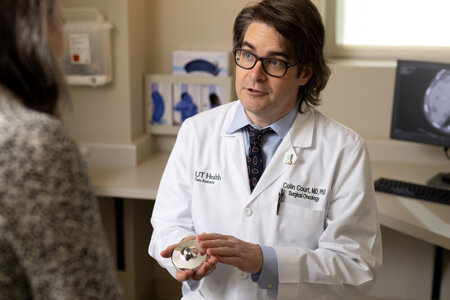
through surgery is pivotal,” said Colin Court, MD, PhD, director of regional therapies at Mays Cancer Center and assistant professor at UT Health San Antonio.
Court, a surgical oncologist, said the HAI pump is powered by the patient’s body heat to continuously administer chemotherapy directly through the hepatic artery, a vessel that provides blood to the liver. Once implanted, a medical oncologist oversees the patient for the duration of the treatment or the lifetime of the therapy.
“Hepatic artery infusion is a treatment option available for patients to shrink liver metastases to get to surgery, to prevent recurrence in the liver after a liver resection, or to offer another line of treatment when traditional systemic chemotherapy is no longer working,” said Sukeshi Patel Arora, MD, medical oncologist and leader of the gastrointestinal malignancies program at Mays Cancer Center. “The procedure is considered another line of treatment and offers not only control of the cancer, but also allows patients to live longer and gives a chance for a cure.”
A National Cancer Institute (NCI)-designated Cancer Center, Mays Cancer Center is currently one of only two facilities in Texas offering HAI therapy. Prior to the advent of HAI therapy, patients received traditional chemotherapy, administered through a vein and into the bloodstream to reach the liver. HAI therapy is localized and precisely targets tumors. It delivers up to 400 times higher drug concentration than standard chemotherapy, with minimal side effects.
“This therapy gives our patients hope, limiting toxicity elsewhere in the body, and allowing them to continue their daily activities without disruptions,” Court said.
The Mays Cancer Center at UT Health San Antonio is one of only four National Cancer Institute-designated Cancer Centers in Texas. The Mays Cancer Center provides leading-edge cancer care, propels innovative cancer research and educates the next generation of leaders to end cancer in South Texas. To learn more, visit cancer.uthscsa.edu.
Stay connected with the Mays Cancer Center on Facebook, Twitter, LinkedIn, Instagram and YouTube.
The University of Texas Health Science Center at San Antonio (UT Health San Antonio), a primary driver of San Antonio’s $44.1 billion health care and biosciences sector, is the largest academic research institution in South Texas with an annual research portfolio of $413 million. Driving substantial economic impact with its six professional schools, a diverse workforce of more than 8,500, an annual expense budget of $1.46 billion and clinical practices that provide 2.6 million patient visits each year, UT Health San Antonio plans to add more than 1,500 higher-wage jobs over the next five years to serve San Antonio, Bexar County and South Texas. To learn about the many ways “We make lives better®,” visit UTHealthSA.org.


